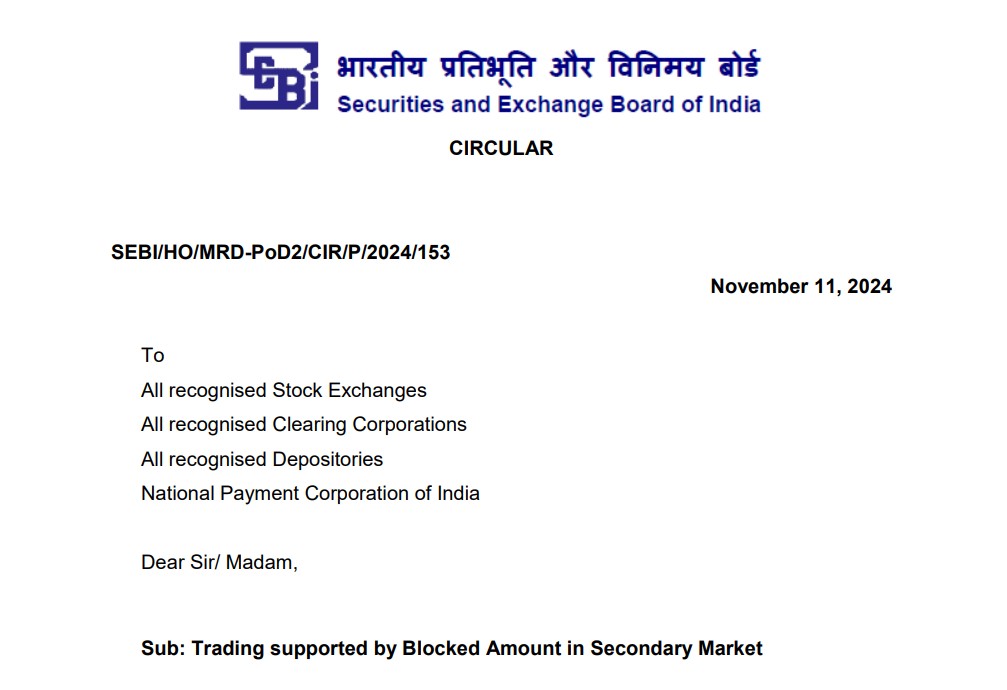The capital market regulator SEBI deserves kudos for introducing investor centric measures in stock market. It has reduced settlement cycle from T+2 to same day settlement. It has introduced direct credit of shares from Clearing Corporation to client demat account. Now it is on the path of implementing trading supported by blocked amount through UPI and 3-in-1 accounts. This means a broker can offer his trading platform but won’t have access to traders’ cash and securities. These measures may sound petty but would have far reaching effect on trading pattern, process and mechanism. Let us discuss.
The background: Stock Brokers have been using several legal and illegal ways to boost their income. They have been collecting brokerage from clients, earning interest over client money, using client margin for trading in proprietary account, lending client margin to other clients for a fee, pledging client shares to get margin, selling client shares without client’s knowledge and so on. Some of the income generation mechanism have been against regulatory norms but there were no check points. Routine audit was of no help because the brokers used to window dress their system before such audits.
SEBI tightened the noose: The capital market regulator SEBI was aware of all these legal-illegal practices and was finding out ways to check the malpractices rampant in broking community. Take an example. If a broker is declared defaulter (liabilities of a broker becomes more than its assets), the clients get trapped. As per existing norms, the clients are compensated to the extent of just Rs 25 lakh irrespective of the amount they had put in their trading account. This means a client who had Rs. 2 Crore in his trading account will be compensated to the extent of just Rs 25 lakh form Investor Protection Fund. The problem arose because client’s money was lying with brokers. If the amount lies in the account of client itself and it gets blocked in his account as per his trading order, there won’t be any need to put money with broker. SEBI’s recent move is aimed at protecting investors and traders from the malpractices of brokers. If the money lies in bank account of client and goes directly into account of the clearing corporation, the broker won’t be able to access client’s money, he won’t be able to earn interest on it, he won’t be able to utilize margin based on it and the client’s money will be safe and secure in case of broker’s default. One diktat of SEBI has put an end to so many evils.
Brokers’ woes: The broking community have been treating clients’ shares as his own. Whenever a client used to buy shares, the shares landed at the pool account of the broker. Broker took a lot of time in transferring those shares into demat account of clients. During this period, most of the brokers indulged in pledging those shares for margin or pledging with NBFCs to raise money. SEBI has clamped down on this malpractice. SEBI has stipulated direct credit of shares into demat account of clients. The shares will land directly from clearing corporation into client’s account. This will check share related malpractices associated with broking community.
A technological innovation: Application Supported by Blocked Amount (ASBA) for Initial Public Offer (IPO) was introduced in the year 2008. This made the process of IPO transparent and robust. People started participating in IPO without transferring the amount into IPO account. The amount was just blocked in client’s bank account and debited only after allotment of shares. The same system has been replicated for secondary market. ASBA system for secondary market went live from 1st January 2024. Now-a-days, if the trader so desires, amount is blocked in trader’s bank account and debit is made as per invoice raised by the broker. Yes, the mechanism of UPI based blocking of amount is an innovative concept. It is technological marvel.
The gimmick of 3-in-1 account: Banks have been selling 3-in-1 account since long. This type of account contains a bank account, a demat account and a trading account. For example, if you open a 3-in-1 account with ICICI Direct, it will contain a trading account with ICICI Direct, a demat account with NSDL/CDSL through ICICI Direct and a bank account with ICICI bank. Your money will lie in bank account and you can transfer it into trading account with ICICI Direct as and when you plan to trade. The securities, if purchased, will be credited into demat account held with NSDL/CDSL through depository participant ICICI Direct. What is new in SEBI Circular?
The 3-in-1 account has been a cash cow for banking brokers. They have been charging clients for transferring amount form bank account to trading account. This charge will vanish away leaving a dent on broker’s income. Such brokerage houses have not been permitting deallocation of money from trading account to bank account on non-trading days. This money was being used by brokerage houses to generate extra income through liquid funds. This practice will become a thing of the past.
The SEBI mandated 3-in-1 account will be somewhat different. Money will lie in bank account and will be blocked in the bank account itself as per order placed for trading. The amount will be deducted and transferred to Clearing Corporation bank account directly and the shares will be transferred into demat account directly from clearing corporation.
In my view, SEBI is utilizing technology to safeguard retail investors who have been robbed by operators, scamsters and brokers since long. The recent measures stipulated by SEBI would minimize the risk associated with defaulting trading member and clearing member.



